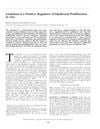 21 citations,
December 2016 in “PLOS ONE”
21 citations,
December 2016 in “PLOS ONE” Scientists made skin stem cells from other human cells with over 97% efficiency, which could help treat skin conditions.
 19 citations,
September 2019 in “PLOS genetics”
19 citations,
September 2019 in “PLOS genetics” Telomere damage affects skin and hair follicle stem cells by messing up important growth signals.
 19 citations,
January 2017 in “Stem Cells International”
19 citations,
January 2017 in “Stem Cells International” Adipose-derived stem cells show promise in treating skin conditions like vitiligo, alopecia, and nonhealing wounds.
 April 2018 in “Journal of Investigative Dermatology”
April 2018 in “Journal of Investigative Dermatology” Kaempferol helps skin stem cells grow and may improve skin thickness due to its 3-OH group.
 15 citations,
August 2013 in “Stem Cells and Development”
15 citations,
August 2013 in “Stem Cells and Development” The method increases stem-like cells for better skin regeneration.
 November 2023 in “npj regenerative medicine”
November 2023 in “npj regenerative medicine” Skin spheroids with both outer and inner layers are key for regrowing skin patterns and hair.
253 citations,
April 2008 in “Current opinion in cell biology” Notch signalling helps skin cells differentiate and prevents tumors.
41 citations,
April 2012 in “The journal of investigative dermatology/Journal of investigative dermatology” Deleting MED1 in skin cells causes hair loss and skin changes.
 22 citations,
November 2012 in “Journal of cosmetic dermatology”
22 citations,
November 2012 in “Journal of cosmetic dermatology” Stem cells can rejuvenate skin, restore hair, and aid in wound healing.
6 citations,
May 2023 in “International journal of molecular sciences” Collagen-enhanced mesenchymal stem cells significantly improve skin wound healing.
 March 2024 in “Advanced healthcare materials/Advanced Healthcare Materials”
March 2024 in “Advanced healthcare materials/Advanced Healthcare Materials” Scientists developed a new way to create skin-like structures from stem cells using a special 3D gel and a device that improves cell organization and increases hair growth.

Injecting a person's own skin cells back into their skin is a promising, safe, and affordable treatment for skin disorders.
 April 2023 in “The journal of investigative dermatology/Journal of investigative dermatology”
April 2023 in “The journal of investigative dermatology/Journal of investigative dermatology” EGFR deficiency causes significant changes in skin cells and hair follicles.
 2 citations,
November 1998 in “Journal of The European Academy of Dermatology and Venereology”
2 citations,
November 1998 in “Journal of The European Academy of Dermatology and Venereology” Prednisone reduces organ mast cell infiltration but does not alter the abnormal appearance of mast cells in systemic mastocytosis.

Sensory neurons and Merkel cells remodel at different rates during normal skin maintenance.
30 citations,
June 1993 in “The Journal of Cell Biology” The oncoprotein causes abnormal hair growth without increasing skin cancer risk.
 28 citations,
February 1999 in “Journal of Investigative Dermatology”
28 citations,
February 1999 in “Journal of Investigative Dermatology” Urokinase, a type of protein, helps skin cells multiply faster, especially in newborn mice.
 253 citations,
March 1994 in “Developmental dynamics”
253 citations,
March 1994 in “Developmental dynamics” Apoptosis is essential for human skin development and forming a functional epidermis.
 72 citations,
July 2012 in “Journal of Investigative Dermatology”
72 citations,
July 2012 in “Journal of Investigative Dermatology” Mice lacking a key DNA methylation enzyme in skin cells have a lower chance of activating stem cells necessary for hair growth, leading to progressive hair loss.
 36 citations,
April 2013 in “Cell and Tissue Research”
36 citations,
April 2013 in “Cell and Tissue Research” Bone-marrow and epidermal stem cells help heal wounds differently, with bone-marrow cells aiding in blood vessel formation and epidermal cells in hair growth.
 8 citations,
November 2020 in “Nature Communications”
8 citations,
November 2020 in “Nature Communications” Adult stem cells with Tp63 can form hair and skin cells when placed in new skin, showing they have hidden abilities for skin repair.
 November 2023 in “Linköping University medical dissertations”
November 2023 in “Linköping University medical dissertations” Keratinocytes and adipose-derived stem cells can effectively heal difficult skin wounds.
28 citations,
July 1993 in “The journal of investigative dermatology/Journal of investigative dermatology” Dermal papilla cells are crucial for hair growth and can induce new hair follicles.
 June 2007 in “Faculty Opinions – Post-Publication Peer Review of the Biomedical Literature”
June 2007 in “Faculty Opinions – Post-Publication Peer Review of the Biomedical Literature” Hair can regrow in adult mice's skin after injury, and this regrowth doesn't come from existing hair cells but from skin cells in the wound, with Wnt7a protein helping this process. This could help treat baldness and scarring.
 May 2007 in “Faculty Opinions – Post-Publication Peer Review of the Biomedical Literature”
May 2007 in “Faculty Opinions – Post-Publication Peer Review of the Biomedical Literature” Hair can regrow in adult mice's skin after injury, and this regrowth doesn't come from existing hair cells but from skin cells in the wound, with Wnt7a protein helping this process. This could help treat baldness and scarring.
949 citations,
January 2001 in “Cell” Adult mouse skin contains stem cells that can create new hair, skin, and oil glands.
 788 citations,
February 2007 in “Nature”
788 citations,
February 2007 in “Nature” The document concludes that skin stem cells are important for hair growth and wound healing, and could be used in regenerative medicine.
 293 citations,
November 2011 in “Nature”
293 citations,
November 2011 in “Nature” The circadian clock affects skin stem cell behavior, impacting aging and cancer risk.
 153 citations,
October 2007 in “Cell Stem Cell”
153 citations,
October 2007 in “Cell Stem Cell” New research suggests that skin cell renewal may not require a special type of cell previously thought to be essential.
 133 citations,
September 2013 in “Nature Reviews Molecular Cell Biology”
133 citations,
September 2013 in “Nature Reviews Molecular Cell Biology” Different types of stem cells and their environments are key to skin repair and maintenance.
























